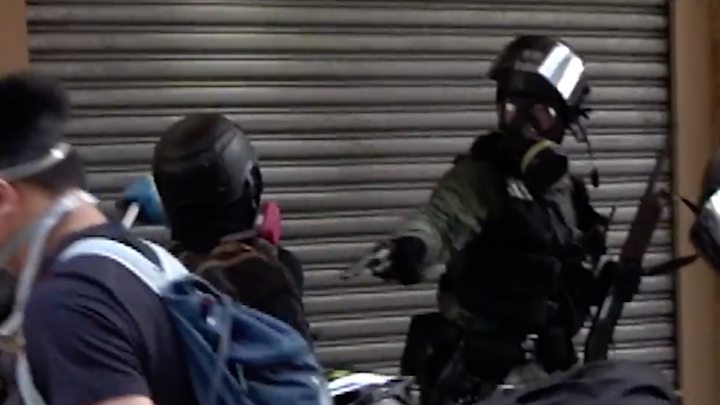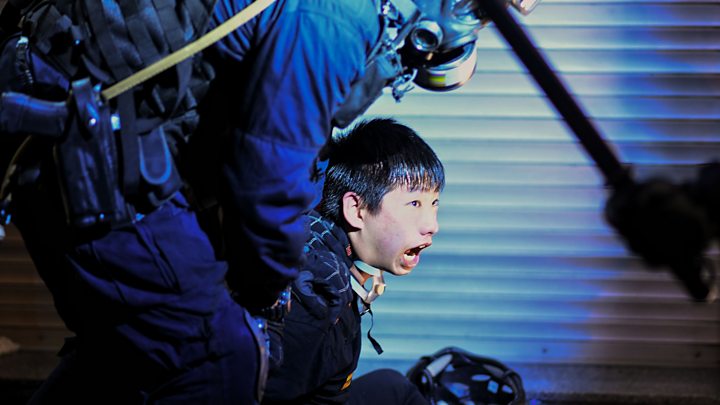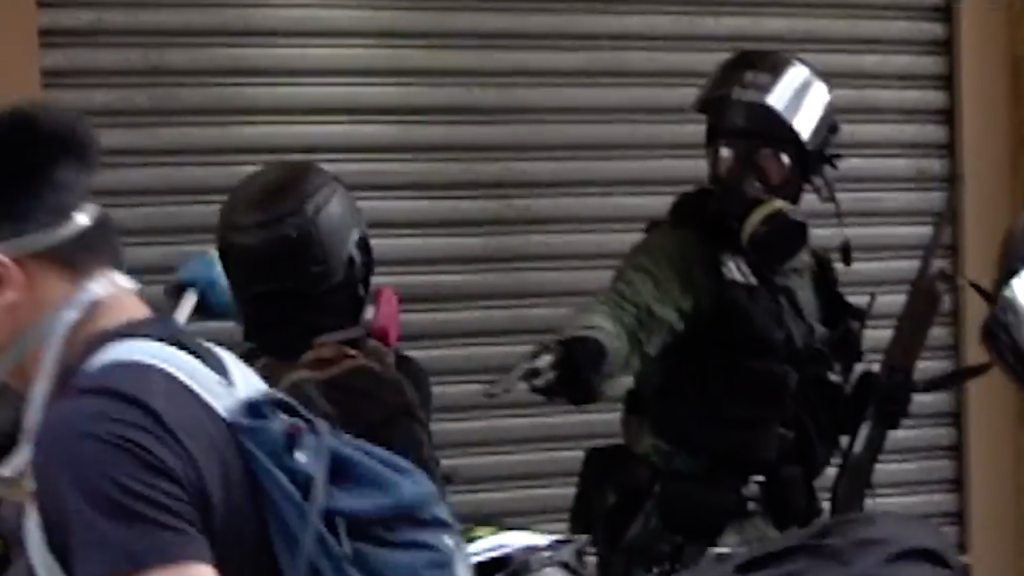
Media playback is unsupported on your device
The 70 th anniversary of Communist Party rule in China was “one of Hong Kong’s most violent and chaotic days”, the city’s police chief has said.
(An) – year-old protester was shot in the chest with a live bullet – one of six live rounds fired by police.
Protesters – armed with petrol bombs and projectiles – fought pitched battles with police in several parts of Hong Kong.
In total, 104 people were taken to hospital and 180 were arrested.
Police chief Stephen Lo said 25 officers were also injured.
In the days leading up the anniversary, tensions were high in Hong Kong, which always sees protests on the anniversary.
This year, however, Hong Kong has seen four months of protests sparked by proposed changes to an extradition bill.
Though the changes have been abandoned, the unrest has continued, expanding into demands for greater democracy.
) Image copyright EPA
The shooting of Tsang Chi-kin, who was attacking an officer with a pole, was captured on video and shared online.
“My chest is hurting, I need to go to hospital,” the 18 – year -old said. The government said he was in a stable condition.
Although people have been shot with rubber bullets in previous protests, this was the first injury from a live round.
Mr Lo said firing the bullet was “lawful and reasonable” as the officer thought his and colleagues’ lives were under threat.
Asked why the bullet was fired at close range, Mr Lo said: “He [the officer] did not decide the distance between him and the assailant.”
What made Tuesday different?
In Beijing, the anniversary of Communist Party rule saw a parade ofChinese military might: 15, 000 troops, 580 pieces of equipment, and 160 aircraft.
In Hong Kong, some 1, 200 miles away, protesters marked the day somewhat differently.
Peaceful marches soon exploded into violence. BBC reporter Tessa Wong, who was on the streets, said protesters fought “pitched battles” with officers.
Shortly before Tsang Chi-kin was shot, men wearing helmets and gas masks attacked an officer on the ground with a pole.
An officer responded by firing his gun at close range.
Elsewhere, protesters threw petrol bombs, started fires, and ran at officers. Police responded with water cannon, tear gas, and – in total – six live rounds.
The day saw the highest number of arrests since this year protests began, and the highest number of live rounds fired.
What explains the anger?
The protests were sparked earlier this year by a proposed law, which would have allowed extradition from Hong Kong to the Chinese mainland.
Opponents thought this would put Hong Kongers at risk of unfair trials, and, in July, Hong Kong leader Carrie Lamsaid the law “was dead”.
But, despite the law being withdrawn, the protests continued every weekend.
Clashes between police and protesters created their own momentum, and there is wider discontent, too.
Recent years have seen growing opposition to the perceived encroachment of Beijing on Hong Kong’s politics and threats to local identity.
Many young people haveeconomic worries,and there are also demands foruniversal suffragefor elections to Hong Kong’s parliament.
As China showed off its superpower status in Beijing, violence in Hong Kong – a special administrative region of China – was inevitable.
What is the background?
Until 1997, Hong Kong was a British territory. Since then, it has been part of China but with its own system of law and government – known as One Country, Two Systems.
Hong Kong has its own judiciary and a separate legal system. Rights including freedom of assembly and freedom of speech are protected.
But those freedoms – the Basic Law – expire in 2047. It is not clear what Hong Kong’s status will be then.

Media playback is unsupported on your device







GIPHY App Key not set. Please check settings